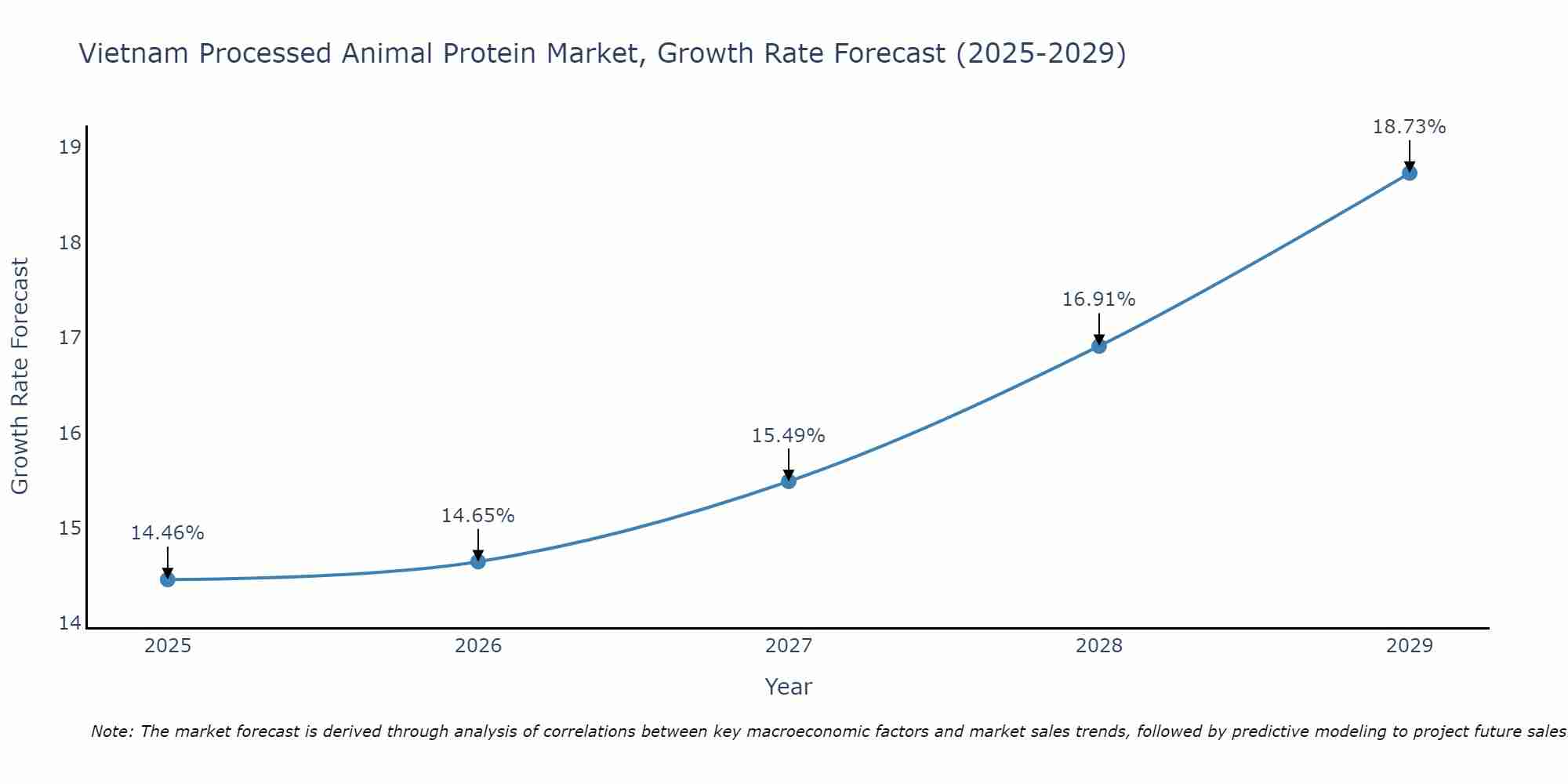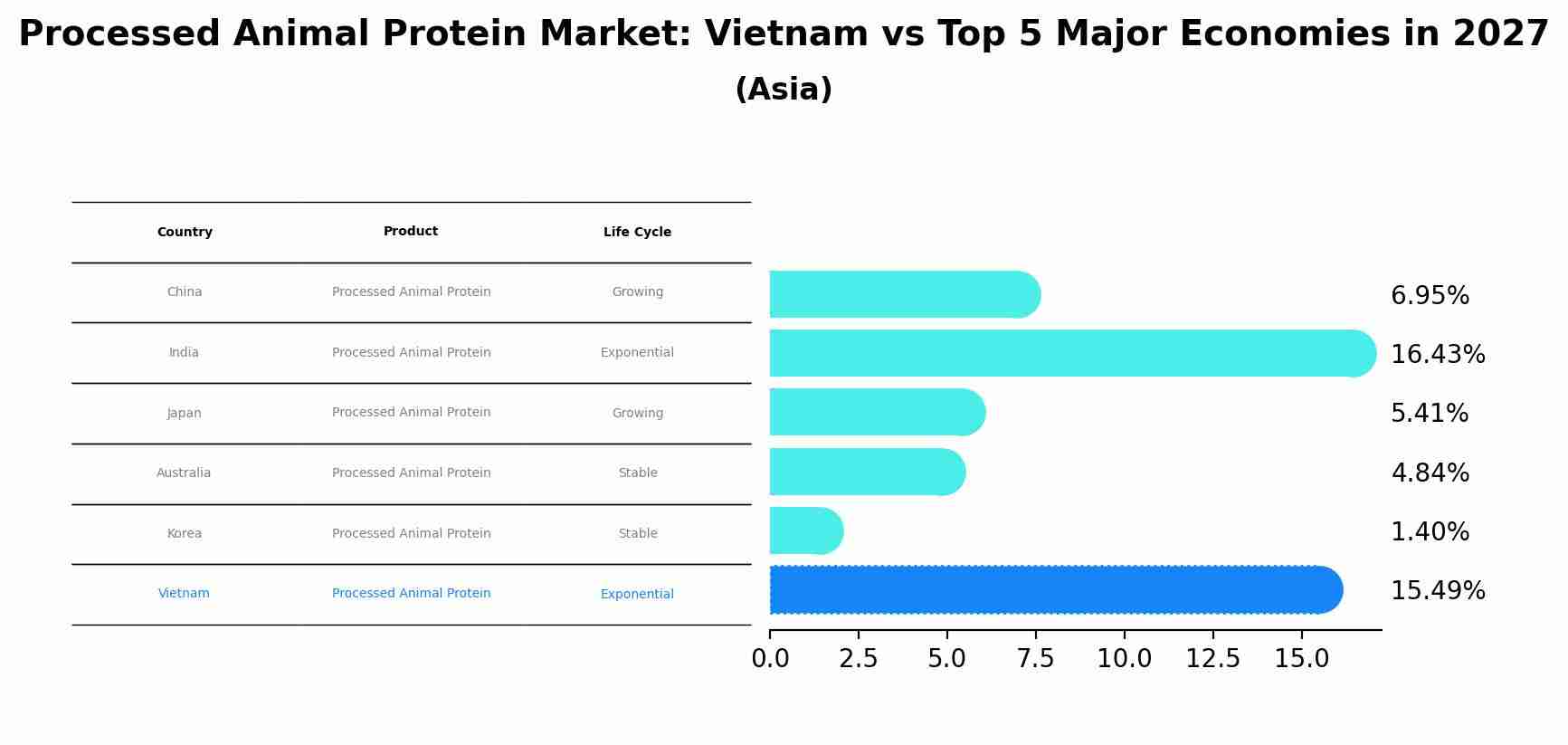Vietnam Processed Animal Protein Market (2025-2031) Outlook | Value, Size, Revenue, Industry, Share, Analysis, Companies, Forecast, Growth & Trends
| Product Code: ETC411926 | Publication Date: Oct 2022 | Updated Date: Apr 2025 | Product Type: Market Research Report | |
| Publisher: 6Wresearch | Author: Ravi Bhandari | No. of Pages: 75 | No. of Figures: 35 | No. of Tables: 20 |
Vietnam Processed Animal Protein Market Size Growth Rate
The Vietnam Processed Animal Protein Market is likely to experience consistent growth rate gains over the period 2025 to 2029. Commencing at 14.46% in 2025, growth builds up to 18.73% by 2029.

Processed Animal Protein Market: Vietnam vs Top 5 Major Economies in 2027 (Asia)
By 2027, the Processed Animal Protein market in Vietnam is anticipated to reach a growth rate of 15.49%, as part of an increasingly competitive Asia region, where China remains at the forefront, supported by India, Japan, Australia and South Korea, driving innovations and market adoption across sectors.

Vietnam Processed Animal Protein Market Synopsis
The processed animal protein market in Vietnam is a crucial component of the country`s agriculture and food processing industries. It includes products like meat, poultry, and fish that undergo processing to extend shelf life and meet consumer preferences. As the Vietnamese population`s income levels rise, there is a growing demand for processed animal protein products. However, the market also faces challenges related to food safety and hygiene, necessitating stricter regulations and quality control measures to ensure consumer trust.
Drivers of the Market
The Vietnam processed animal protein market is being driven by several key factors. First and foremost, the growing population and rising income levels in Vietnam have led to an increased demand for protein-rich foods. This has driven the consumption of processed animal proteins like meat products, poultry, and seafood. Additionally, urbanization and changing lifestyles have led to a shift in dietary preferences towards convenience foods, which often contain processed animal proteins. Furthermore, the export potential of Vietnamese processed animal protein products to international markets is a significant driver, as the country has been making efforts to meet global food safety standards and expand its export footprint.
Challenges of the Market
The processed animal protein market in Vietnam grapples with concerns related to food safety and quality control. Ensuring consistent quality standards while sourcing raw materials from diverse suppliers can be challenging. Rising consumer awareness of ethical and sustainable sourcing practices further adds complexity to the market.
COVID-19 Impact on the Market
The COVID-19 pandemic had complex effects on the Vietnam processed animal protein market. While there was a surge in demand for protein-rich foods, including processed animal products, disruptions in the supply chain posed challenges. Lockdowns and restrictions impacted the operation of processing facilities, leading to production delays. Moreover, the closure of restaurants and hotels affected the foodservice sector, which is a significant market for processed animal protein. Companies in this market had to adapt by focusing on retail sales and implementing safety measures to ensure the continuity of production.
Key Players in the Market
The processed animal protein market in Vietnam is characterized by several key players, including CP Group, Japfa Comfeed Vietnam, and Cargill. CP Group is a Thai conglomerate with a significant presence in the Vietnamese animal protein industry, producing poultry and other meat products. Japfa Comfeed Vietnam is a subsidiary of Japfa Group, a leading player in the animal protein business, while Cargill is a global agribusiness giant involved in animal feed production and processing.
Key Highlights of the Report:
- Vietnam Processed Animal Protein Market Outlook
- Market Size of Vietnam Processed Animal Protein Market, 2024
- Forecast of Vietnam Processed Animal Protein Market, 2031
- Historical Data and Forecast of Vietnam Processed Animal Protein Revenues & Volume for the Period 2021-2031
- Vietnam Processed Animal Protein Market Trend Evolution
- Vietnam Processed Animal Protein Market Drivers and Challenges
- Vietnam Processed Animal Protein Price Trends
- Vietnam Processed Animal Protein Porter's Five Forces
- Vietnam Processed Animal Protein Industry Life Cycle
- Historical Data and Forecast of Vietnam Processed Animal Protein Market Revenues & Volume By Source for the Period 2021-2031
- Historical Data and Forecast of Vietnam Processed Animal Protein Market Revenues & Volume By Poultry for the Period 2021-2031
- Historical Data and Forecast of Vietnam Processed Animal Protein Market Revenues & Volume By Pork for the Period 2021-2031
- Historical Data and Forecast of Vietnam Processed Animal Protein Market Revenues & Volume By Beef for the Period 2021-2031
- Historical Data and Forecast of Vietnam Processed Animal Protein Market Revenues & Volume By Others for the Period 2021-2031
- Historical Data and Forecast of Vietnam Processed Animal Protein Market Revenues & Volume By Form for the Period 2021-2031
- Historical Data and Forecast of Vietnam Processed Animal Protein Market Revenues & Volume By Dry for the Period 2021-2031
- Historical Data and Forecast of Vietnam Processed Animal Protein Market Revenues & Volume By Liquid for the Period 2021-2031
- Vietnam Processed Animal Protein Import Export Trade Statistics
- Market Opportunity Assessment By Source
- Market Opportunity Assessment By Form
- Vietnam Processed Animal Protein Top Companies Market Share
- Vietnam Processed Animal Protein Competitive Benchmarking By Technical and Operational Parameters
- Vietnam Processed Animal Protein Company Profiles
- Vietnam Processed Animal Protein Key Strategic Recommendations
Frequently Asked Questions About the Market Study (FAQs):
Export potential assessment - trade Analytics for 2030
Export potential enables firms to identify high-growth global markets with greater confidence by combining advanced trade intelligence with a structured quantitative methodology. The framework analyzes emerging demand trends and country-level import patterns while integrating macroeconomic and trade datasets such as GDP and population forecasts, bilateral import–export flows, tariff structures, elasticity differentials between developed and developing economies, geographic distance, and import demand projections. Using weighted trade values from 2020–2024 as the base period to project country-to-country export potential for 2030, these inputs are operationalized through calculated drivers such as gravity model parameters, tariff impact factors, and projected GDP per-capita growth. Through an analysis of hidden potentials, demand hotspots, and market conditions that are most favorable to success, this method enables firms to focus on target countries, maximize returns, and global expansion with data, backed by accuracy.
By factoring in the projected importer demand gap that is currently unmet and could be potential opportunity, it identifies the potential for the Exporter (Country) among 190 countries, against the general trade analysis, which identifies the biggest importer or exporter.
To discover high-growth global markets and optimize your business strategy:
Click Here- Single User License$ 1,995
- Department License$ 2,400
- Site License$ 3,120
- Global License$ 3,795
Search
Thought Leadership and Analyst Meet
Our Clients
Related Reports
- Saudi Arabia Car Window Tinting Film, Paint Protection Film (PPF), and Ceramic Coating Market (2025-2031) | Strategy, Consumer Insights, Analysis, Investment Trends, Opportunities, Growth, Size, Share, Industry, Revenue, Segments, Value, Segmentation, Supply, Forecast, Restraints, Outlook, Competition, Drivers, Trends, Demand, Pricing Analysis, Competitive, Strategic Insights, Companies, Challenges
- South Africa Stationery Market (2025-2031) | Share, Size, Industry, Value, Growth, Revenue, Analysis, Trends, Segmentation & Outlook
- Afghanistan Rocking Chairs And Adirondack Chairs Market (2026-2032) | Size & Revenue, Competitive Landscape, Share, Segmentation, Industry, Value, Outlook, Analysis, Trends, Growth, Forecast, Companies
- Afghanistan Apparel Market (2026-2032) | Growth, Outlook, Industry, Segmentation, Forecast, Size, Companies, Trends, Value, Share, Analysis & Revenue
- Canada Oil and Gas Market (2026-2032) | Share, Segmentation, Value, Industry, Trends, Forecast, Analysis, Size & Revenue, Growth, Competitive Landscape, Outlook, Companies
- Germany Breakfast Food Market (2026-2032) | Industry, Share, Growth, Size, Companies, Value, Analysis, Revenue, Trends, Forecast & Outlook
- Australia Briquette Market (2025-2031) | Growth, Size, Revenue, Forecast, Analysis, Trends, Value, Share, Industry & Companies
- Vietnam System Integrator Market (2025-2031) | Size, Companies, Analysis, Industry, Value, Forecast, Growth, Trends, Revenue & Share
- ASEAN and Thailand Brain Health Supplements Market (2025-2031) | Strategy, Consumer Insights, Analysis, Investment Trends, Opportunities, Growth, Size, Share, Industry, Revenue, Segments, Value, Segmentation, Supply, Forecast, Restraints, Outlook, Competition, Drivers, Trends, Demand, Pricing Analysis, Competitive, Strategic Insights, Companies, Challenges
- ASEAN Bearings Market (2025-2031) | Strategy, Consumer Insights, Analysis, Investment Trends, Opportunities, Growth, Size, Share, Industry, Revenue, Segments, Value, Segmentation, Supply, Forecast, Restraints, Outlook, Competition, Drivers, Trends, Demand, Pricing Analysis, Competitive, Strategic Insights, Companies, Challenges
Industry Events and Analyst Meet
Whitepaper
- Middle East & Africa Commercial Security Market Click here to view more.
- Middle East & Africa Fire Safety Systems & Equipment Market Click here to view more.
- GCC Drone Market Click here to view more.
- Middle East Lighting Fixture Market Click here to view more.
- GCC Physical & Perimeter Security Market Click here to view more.
6WResearch In News
- Doha a strategic location for EV manufacturing hub: IPA Qatar
- Demand for luxury TVs surging in the GCC, says Samsung
- Empowering Growth: The Thriving Journey of Bangladesh’s Cable Industry
- Demand for luxury TVs surging in the GCC, says Samsung
- Video call with a traditional healer? Once unthinkable, it’s now common in South Africa
- Intelligent Buildings To Smooth GCC’s Path To Net Zero


















